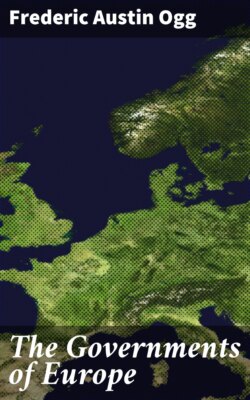Читать книгу The Governments of Europe - Frederic Austin Ogg - Страница 48
На сайте Литреса книга снята с продажи.
III. Organization of the House of Lords
Оглавление131. Sittings and Attendance.—It is required that the two houses of Parliament shall be convened invariably together, and one may not be prorogued without the other. The actual sittings of the Lords are, however, very much briefer and more leisurely than are those of the Commons. Normally the upper chamber meets but four times a week—on Mondays, Thursdays, and Fridays at 4.30 o'clock and on Tuesdays at 5.30. By reason of lack of business or indisposition to consume time in the consideration of measures whose eventual enactment is assured, sittings not infrequently are concluded within an hour, although, of course, there are occasions upon which the chamber deliberates seriously and at much length. A quorum for the transaction of business is fixed at the number three; although it is but fair to observe that if a division occurs upon a bill and it is found that there are not thirty members present the question is declared not to be decided. Save upon formal occasions and at times when there is under consideration a measure in whose fate the members are immediately interested, attendance is always meager. There are members who after complying with the formalities incident to the assumption of a seat, rarely, and in some instances never, reappear among their colleagues. It thus comes about that despite the fact that nominally the House of Lords is one of the largest of the world's law-making assemblies, the chamber exhibits in reality little of the unwieldiness ordinarily characteristic of deliberative bodies of such magnitude. The efficiency of the chamber is more likely to be impaired by paucity of attendance than otherwise.
132. Officers.—The officers of the House of Lords are largely appointive, though in part elective. Except during the trial of a peer,[181] the presiding official is the Lord Chancellor, appointed by the crown on the advice of the premier. The duty of presiding in the Lords, as has been explained, is but one of many that fall to this remarkable dignitary.[182] If at the time of his appointment an incumbent is not a peer he is reasonably certain to be created one, although there is no legal requirement to this effect. The theory is that the woolsack which comprises the presiding official's seat is not within the chamber proper[183] and that the official himself, as such, is not a member of the body. The powers allowed him are not even those commonly possessed by a moderator. In the event that two or more peers request the privilege of addressing the chamber, the peers themselves decide which shall have the floor. Order in debate is enforced, not by the Chancellor, but by the members, and when they speak they address, not the chair, but "My Lords." Although, if a peer, the Chancellor may speak and vote as any other member, he possesses as presiding officer no power of the casting vote. In short, the position which the Chancellor occupies in the chamber is all but purely formal. In addition to "deputy speakers," designated to preside in the Chancellor's absence, the remaining officials of the Lords who owe their positions to governmental appointment are the Clerk of Parliament, who keeps the records; the Sergeant-at-Arms, who attends personally the presiding officer and acts as custodian of the mace; and the Gentleman Usher of the Black Rod, a pompous dignitary whose function it is to summon the Commons when their attendance is required and to play a more or less useful part upon other ceremonial occasions. The one important official whom the House itself elects is the Lord Chairman of Committees, whose duty it is to preside in Committee of the Whole.
